Electric Vehicle Battery-Fueled Fires More Deadly Than Gas-Powered, Experts Warn
California Family’s Home Burns Down Due to Tesla Fire in Garage
A series of high-profile lawsuits involving well-known electric vehicle manufacturers Audi, Tesla, and Chevrolet has brought into question the companies’ claims that their cars are less likely to catch fire than gas-powered vehicles.
Safety experts warn that although electric vehicles may not catch fire as easily, any fire that does erupt can burn more intensely and take as long as 24 hours to extinguish.
One of the most recent large-scale fires involved two Teslas left to charge overnight in a garage. The Californian couple who owned the vehicles awoke early one morning last December to the sound of blaring car alarms. They smelled smoke; there was a fire in the house. The fire had started in one Tesla Model S and spread quickly to the other. The vehicles’ lithium-ion batteries amplified the blaze, making the fire burn longer and hotter than a gas-fueled explosion would have.
The couple has not been able to return to their home, which suffered more than $1 million in damages.
The double-vehicle fire makes this a unique case, but it’s only the latest in a string of recent incidents involving electric vehicles bursting into flames. Electric vehicle manufacturers are warning owners not to leave their cars charging unattended in certain circumstances or leaving them fully charged in garages. General Motors, Audi, and Hyundai have recalled hundreds of thousands of electric vehicles following reports of battery fires.
Electric vehicle fires are deadly and have already claimed the lives of dozens of Americans. If you were injured or a loved one killed in an electric vehicle fire, you may be able to hold the manufacturer liable for damages.
Ernst Law Group is a California law firm specializing in product liability. We’ll help you hold the manufacturer accountable for producing and distributing unsafe or defective vehicles. If you’ve suffered any damages from a Tesla, contact our Tesla defect and Tesla autopilot crash lawyers today for a free consultation.
Wrong Way Driver Kills 2
The CHP confirmed today, June 12, 2019, that a wrong way driver on US 101 south of San Luis Obispo resulted in a double fatality wreck.
According to various local news sources, a 22-year-old Washington woman was driving her Ford Fiesta southbound in the northbound lane of US 101 just south of the South Higuera on and off ramps. She collided head-on with a 44-year-old Los Osos man driving a Honda Civic. Both drivers were wearing seatbelts, but due to the force of the crash, both drivers were killed.
The images below show the South Higuera interchange. As one can see there are several intersecting roads leading to parking areas for local hiking trails, north and southbound on and off ramps, and a frontage road.
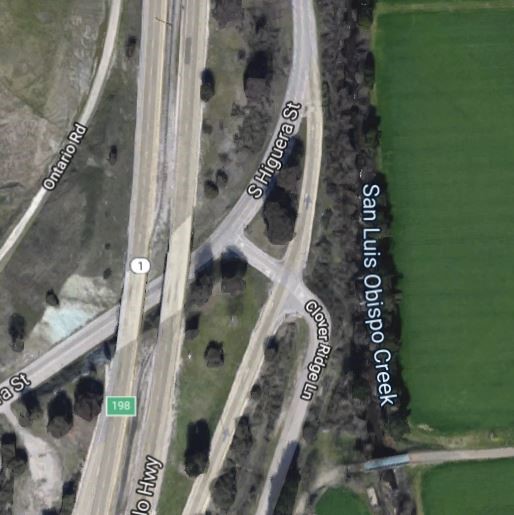 If the wrong way driver entered the northbound lanes heading south at this spot, it is likely that she entered the road as depicted below. A driver intending to make a right turn onto Clover Ridge is faced with two options, the second of which is the frontage road. The first road one would encounter is the northbound off-ramp. There are signs warning of entering the freeway off-ramp as “Wrong Way”, but the signed is placed directly between the off-ramp and the frontage road. Further investigation will be needed to determine exactly what happened.
If the wrong way driver entered the northbound lanes heading south at this spot, it is likely that she entered the road as depicted below. A driver intending to make a right turn onto Clover Ridge is faced with two options, the second of which is the frontage road. The first road one would encounter is the northbound off-ramp. There are signs warning of entering the freeway off-ramp as “Wrong Way”, but the signed is placed directly between the off-ramp and the frontage road. Further investigation will be needed to determine exactly what happened.
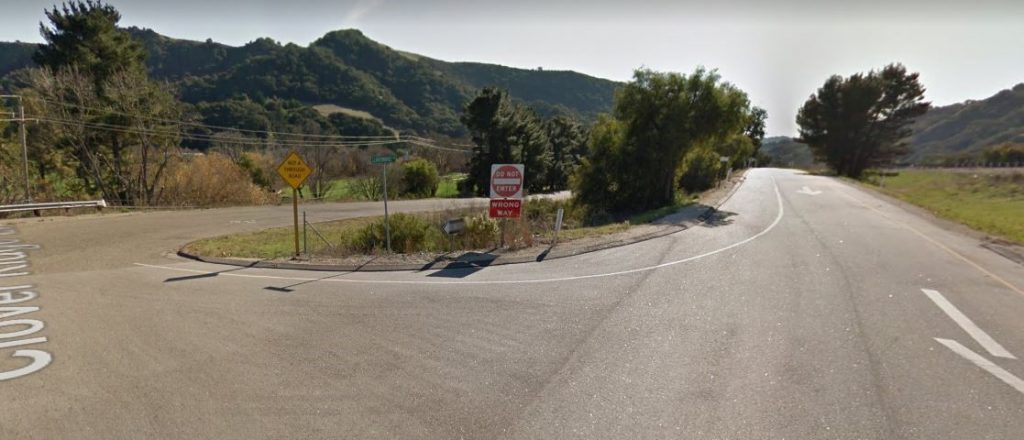 The United State Department of Transportation Federal Highway Administration has undertaken extensive studies of the phenomenon of wrong way drivers. The answers are usually multi-disciplinary, involving traffic design, speeds, human factors and visibility.
The United State Department of Transportation Federal Highway Administration has undertaken extensive studies of the phenomenon of wrong way drivers. The answers are usually multi-disciplinary, involving traffic design, speeds, human factors and visibility.
A study from the NCBI found that the reasons for wrong way crashes often depend on the time of the crash, age of the driver, day of the week and, of course, impairment and driver distraction.
In a crash of this magnitude, the CHP MAIT team will surely investigate. MAIT is the Multidisciplinary Accident Investigation Team and is an elite group of officers trained to conduct in-depth and detailed investigation of major crashes.
If an investigation shows that the wrong way driver is legally responsible for the Los Osos man’s death his heirs would be entitled to a bring a Wrongful Death claim seeking to recover damages based on the loss of their loved one. This would include lost economic support, but most significantly, the loss of a son, father or husband.
If you have been effected by a car accident, our team is here to help. Contact our San Luis Obispo car accident lawyers today.
Fatal Big-Rig Crash in Orcutt
A tragic wreck was reported this morning. A big-rig is alleged to have run a red light and struck multiple vehicles. The truck rolled over due to the force of the impact.
Two people died in the crash and 6 to 8 others were being evaluated for various injuries.
As of this morning southbound Highway 135 is still closed.
The driver of the big-rig was arrested for driving under the influence of drugs and/or alcohol. In reviewing photos graphs of the wreckage it appears that the truck was a Sysco truck.
Sysco is a large food distribution company.
Sysco Central California is based in Modesto, Ca. and reports having 104 drivers covering 2,818,652 miles per year in 2018.
The Federal Motor Carrier Safety Regulations are very strict concerning a driver’s behavior.
The limit for the presence of alcohol in the system is lower than a standard passenger vehicle. According to FMRS § 392.5, a driver cannot have more than a 0.04% blood alcohol level in his system while driving a commercial motor vehicle. This is one-half of the limit for the driver of a passenger vehicle.
Drugs are even a bigger problem with big-rig drivers. Of course, there are some drivers who use illicit drugs simply for the high. However, there is a huge problem with big-rig drivers using stimulants to keep them awake on long drives. A driver arrested for alcohol or drug use so early in the morning lends one to believe that this is a stimulant drug case.
Amphetamines and cocaine may help drivers stay awake, but these drugs can cause vertigo, agitation, hallucinations and change perceptions and reactions, which are critical areas for a truck driver.
Whenever a truck driver is involved in a wreck there are several factors that must be immediately evaluated.
First, a driver must be tested immediately after a wreck for alcohol or drugs, even if he is not suspected of being under the influence. Here, clearly, the police have suspicion so the driver has already been tested.
Secondly, it is important to examine the log books of the driver. A big-rig driver must keep very careful records detailing every minute of his day. The driver must note whether he is Driving, Off-Duty, On Duty Not Driving or Sleeper Birth. A driver has a limited number of hours that he can be on duty and an even more limited time that he can drive in a defined period of time. Typically a driver cannot be On Duty for more than 60 hours in 7 days, or 80 hours in 8 days. In any given 24-hour period a driver cannot drive more than 11-hours. After driving 11 hours the driver must be Off-Duty before restarting his driving time.
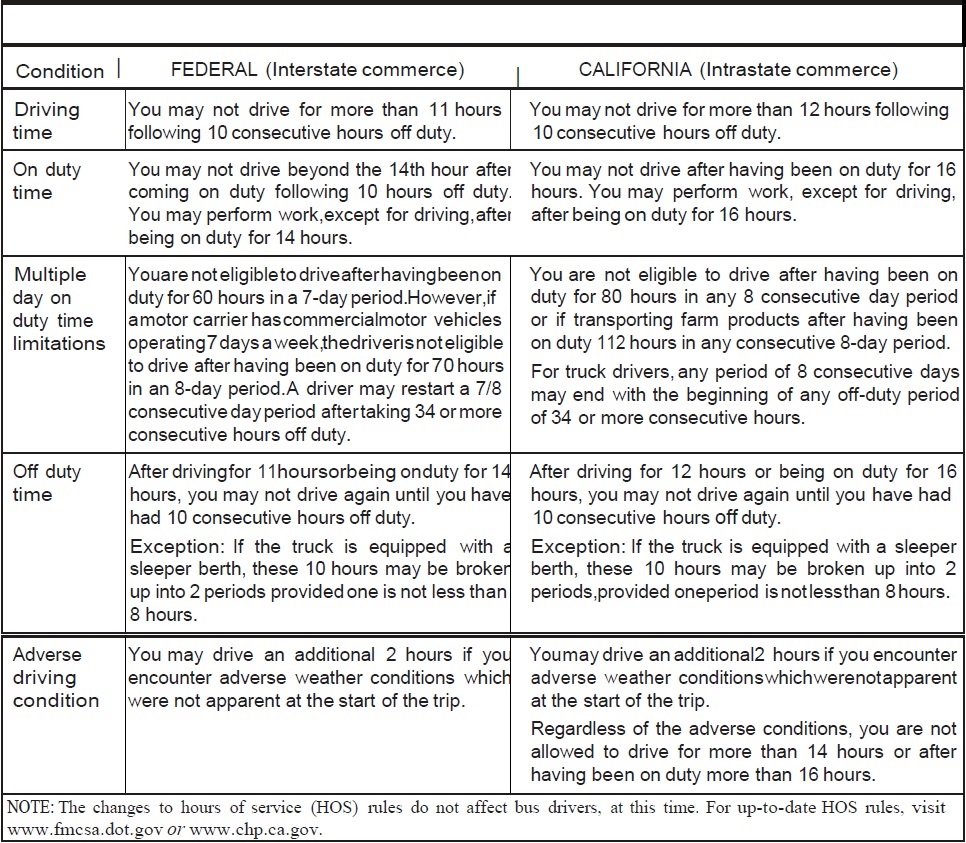
A driver’s record of duty status, in duplicate, must be kept by each driver and each co-driver while driving, on duty but not driving, or resting in a sleeper berth. The record of duty status must be presented for inspection immedilltely upon request by any authorized CHP employee, any regularly employed and salaried police officer, or deputy sheriff. There may be instances when you do not need to maintain a record of duty status.
COLLISION REPORTING
Every driver involved in a collision which results in death, injury, or property damage over $750 must report the collision on a Report of Traffic Accident Occurring in California (SR 1) to DMY. The report forms are available at www.dmv. ca.gov, or by calling 1-800-777-0133, or at CHP and DMV offices.
You (or your authorized representative) must submit the report within 10 days of the collision whether you caused the collision or not and even if the collision occurred on private property. This form is required in addition to any other report made to or by the police, CHP, or your insurance company if the collision resulted in any damage over $750 and/or an injury or death. If you do not report the collision to DMY, your driving privilege will be suspended.
NoTE:CDLholders may downgrade to a noncom mercial license during any mandatory suspension period to be eligible to obtain a restricted license. All tests and fees will be required to upgrade when eligible.
Failure to keep logbooks, or driving over hours is a separate theory of liability against a truck driver.
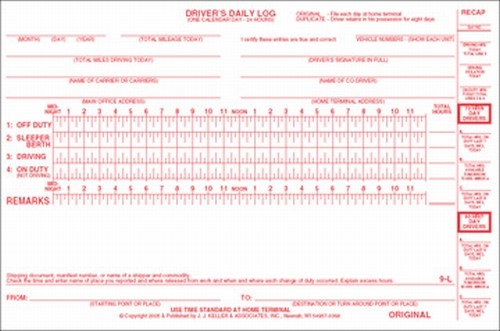
The next question that must be answered when evaluating a trucking case is the role of an employer. Some drivers run as “Owner-Operators”, which means they own and maintain their own trucks, while others work for trucking companies. Either way, the trucking company has obligations to ensure the driver is fit to drive. The driver must be properly trained. The drive must pass random drug tests. The company must have a system in place to review and maintain custody of log books for at least 6-months.
Finally, it is important to determine the amount of insurance coverage available. The FMCSR mandate that a big-rig carry at least $1,000,000 in coverage, but many companies carry more. It is also important to determine if the trailer was separately owned and played some role in the wreck. It is even possible under some circumstances to obtain coverage from the shipper.
If you have been injured, or a loved one has been killed in a big-rig crash it is important to get your attorney involved right away. The insurance companies for the trucking company have “rapid response teams”, which consist of lawyers and investigators who respond to crash scene within hours.
At Ernst Law Group our lawyers are highly skilled and experienced in handling trucking cases in Santa Maria, San Luis Obispo, and throughout the state.
We are available for a no cost, no-obligation consultation when you call us at (805) 541-300. Choosing the right lawyer is key. Be sure you feel comfortable with your lawyer and that you are not pressured. Be wary of lawyers who contact you without your consent, often times with glossy presentations about their firm. At Ernst Law Group we believe that a client should evaluate his or her own situation without pressure or questionable direct solicitation.
Further Update to This Story From 2/11/19
The names of the two men killed in this tragic wreck have been identified as Rick Motley, age 60, and Jesse Gluyas, age 24. Both men worked for VTC Enterprises.
The CHP has identified the driver of the big-rig involved in this morning’s fatal crash on Union Valley Parkway in Orcutt. The driver is allegedly 56 year old Gilbert Pena of Santa Maria.
The 8 injured people are reportedly all from the Santa Maria area.
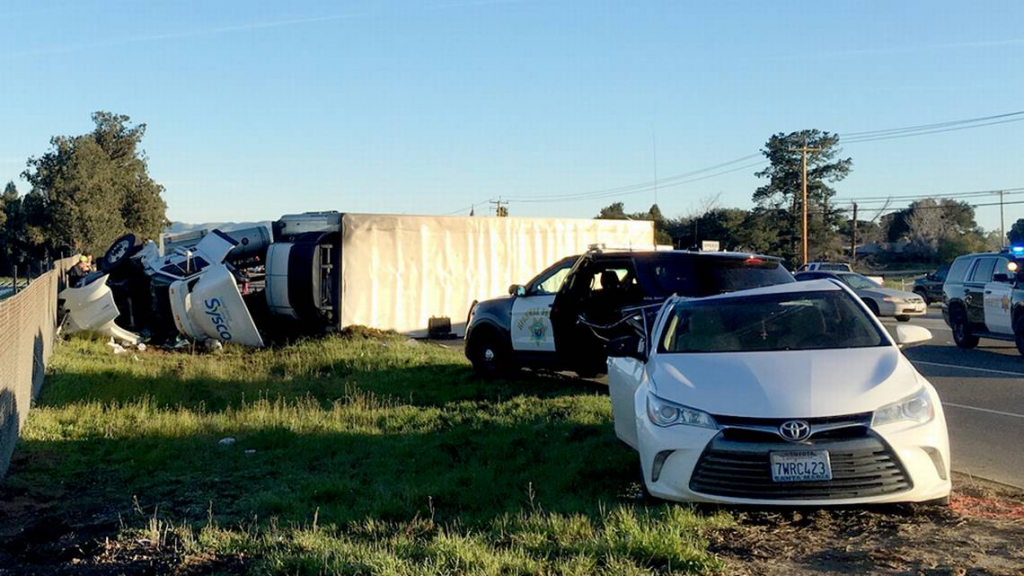
Bus Driver Arrested After Las Alamos Bus Crash
According to KSBY, Laur Mae Gish, age 50, of Goleta, was arrested Friday afternoon for being under the influence of a controlled substance after crashing a passenger bus carrying 25 people. The crash reportedly happened on US Highway 101, just a few miles north of the Highway 154 interchange.
According to reports, at least six passengers were taken to the hospital with various injuries. The bus drifted to the side of the road, hit a tree, and flipped onto its side. With many buses not providing seatbelts for passengers, this type of crash can have devastating consequences, including broken bones and traumatic brain injuries.
Any driver is responsible for negligent driving, but a bus driver owes an even higher standard of care. In California, a Common Carrier must use the “highest care and vigilance of a very cautious person. They must do all that human care, vigilance, and foresight reasonably can do under the circumstances to avoid harm to passengers.”
In addition to the driver, the employer is most certainly also liable for the crash. The driver was no doubt driving in the course and scope of her employment, which makes the employer vicariously liable.
Another key determination will be the drug use history. A bus company has a duty to drug test drivers on a random basis. Employing a driver with a drug use history is a violation and can lead to punitive damages.
If you have been injured in a commercial vehicle crash, contact the personal injury attorneys at Ernst Law Group today at (805) 541-0300.
Where and When Car Accidents Happen Most Often
Car accidents are a daily occurrence in San Luis Obispo. You probably pass at least one every week during your commute. We almost expect to see wrecks when we’re driving on the highway, but the dangers of car accidents often hits much closer to home — literally.
Accidents happen closer to home than people may think. In fact, according to statistics, most car accidents take place within 25 miles of a person’s home. In fact, some surveys show that nearly 90 percent of car accident injuries occur within 10 miles of home. It stands to reason that this would be the case, as this is most people’s radius of typical travel.
At Ernst Law Group, our San Luis Obispo car accident lawyers know how dangerous even the seemingly most minor wrecks can be. A simple fender bender can result in broken bones, whiplash and more.
Understanding when and where car accidents are most likely to happen can help you avoid common wrecks and stay safe on the road.

The Most Dangerous Times of Day
The more cars that are on the road, the greater your risk of being involved in an accident. It should comes as no surprise that the most vulnerable times of day for drivers are in the late afternoon and early evening when commuters are returning home from work. In 2016, the greatest number of car accidents occurred between 4 and 7 p.m.
The next-highest number of accidents happened between 7 and 10 p.m. This may be attributed to the fact that this time in the evening is when people decide to go out, especially on the weekends.
What does come as a surprise is that it may not be the highways that are most dangerous. According to the National Highway Traffic Safety Administration, more accidents that proved fatal were on rural roads than on urban streets.

Looking at the Statistics in California
According to the California Highway Patrol, the most dangerous time to be on the road is 8 to 9 p.m. on a Sunday. During that time, 48 fatal accidents occurred in 2015. When it comes to accidents resulting in injury, however, 5 to 6 p.m. on a Friday is the most dangerous. In 2015, 2,562 accidents occurred during this time that resulted in injury.
In total, Saturdays saw the most fatal car accidents in 2015 with 534 wrecks. Fridays were the most common days for wrecks resulting in injury, with 28,650 accidents.
In addition, October was the most common month for injurious car accidents, with 17,041 occurring during that month in 2015. December, however, was the most dangerous for fatal accidents, at 299 wrecks.
When it comes to dangerous areas in California where accidents happen, it may come as little surprise that 6 of the country’s top 50 most dangerous highways are in our state. These include:
- I-5 (ranked 4th most dangerous, with 680 fatal crashes between 2010 and 2016)
- SR-2 (ranked 14th, 52 fatal crashes)
- US-101 (ranked 16th, 597 fatal crashes)
- I-8 (ranked 39th, 134 fatal crashes)
- SR-99 (ranked 43rd, 411 fatal crashes)
In these rankings, it’s important to note that fatal crashes are not the only factor. But, for our purposes, they do paint an accurate picture of how dangerous these highways are.
If we zoom in closer on San Luis Obispo, there are five intersections that are especially dangerous for drivers. These are:
- Santa Rosa Street and Foothill Boulevard: 82 accidents
- Los Osos Valley Road and Calle Joaquin: 76 accidents
- California Boulevard and Foothill Boulevard: 48 accidents
- Los Osos valley Road and Froom Ranch Way: 44 accidents
- Santa Rosa Street and Olive Street: 42 accidents

Staying Safe on the Road
When is the last time that you got to work and didn’t know how you had arrived there? Last week? Yesterday? This zoning out is a result of our getting into a state of autopilot after driving the same route so many times.
This zoning out can put us at greater risk of accident. Two of the most important things you can do for yourself, especially on trips close to home, are to stay aware of what is happening in and around your vehicle and securing your seat belt.
You should also make sure you’re driving defensively. Between people wanting to get home, tourists not knowing where they’re going and people who simply aren’t good drivers, the roads are full of dangerous drivers. Be ready to react to anything they do, whether they swerve in their lane or brake suddenly. Being in control means you’ll be at a lower risk for being in a wreck.
Talk to a San Luis Obispo Car Accident Attorney Today
As you may have realized by now, driving around California can be dangerous. If you happen to get into a wreck, the San Luis Obispo car accident lawyers at Ernst Law Group are here to help you.
You have legal rights, especially if that accident was caused by someone’s error or negligence. Call our office today at (805) 541-0300 or contact us online to schedule a case evaluation and learn more about what our firm can do for you.
What California’s Laws Have to Say About Speeding
California’s seemingly endless stretches of scenic highway practically beg to be driven upon. When drivers take this enthusiasm too far, though, they are not only endangering others but putting themselves at risk of serious criminal charges.
The state of California uses several overlapping statutes to set legal speed limits — in addition to laying out the consequences for when those limits are violated. Most public roadways in the state are given general speed limits that come into effect even if there is no visible limit posted.
Ignorance of these laws is no excuse. Drivers who get involved in a car accident or exhibit reckless behavior will likely see charges if there’s evidence they were driving above the speed limits.
Our lawmakers and law enforcement agencies have good reason to take speeding so seriously. A report on 2017 fatal crashes in California found that 1,056 of them were caused by speeding drivers. That number represents a 6% increase from 2014. Looking at national data from 2005 to 2014, drivers who were speeding killed nearly the same amount of people as drivers who were intoxicated.
The San Luis Obispo car accident lawyers at our offices have seen the consequences of such accidents first hand. Accident victims and their family members can suffer major injuries, permanent disabilities, and even premature death. Without an attorney at their side to help them recover their financial losses, they may have also been saddled with a lifetime of debt.
To illustrate the legal consequences of speeding in California, take a look at the following laws along with how they might affect a car accident injury case.

California’s Three Sets of Speeding Laws
The state of California uses no less than three main speeding statutes to lay out expectations to drivers and denote what the consequences are for violating these statutes.
While three different sets of laws may seem like overkill, their central goal is actually to reduce confusion. If a driver is familiar with these laws, they will know what their expected maximum speed should be regardless of the last time they saw a visible speed limit sign. The laws can also work to protect drivers facing citations; if your driving didn’t violate the letter or the spirit of the law, you may even be able to get your charges dropped.
California speeding laws are laid out as follows:
- Basic Speeding Law — States that drivers should always drive in a manner that is responsible and safe while taking current road conditions into account
- Absolute Speed Limits — Describes expected speed limits on major categories of roadways, including freeways, highways, and rural roads
- Presumed Speed Limits — Adds to the absolute speed limit laws with categories for railroad crossings, alleys, highway intersections, residential areas, and school zones
A simple rule of thumb is to use the posted speed limit you see, but reduce your speed for conditions that limit visibility or create danger. If you do not see a posted speed limit, you can assume that the expected speed limit falls into one of the roadway categories as described by the three main laws.
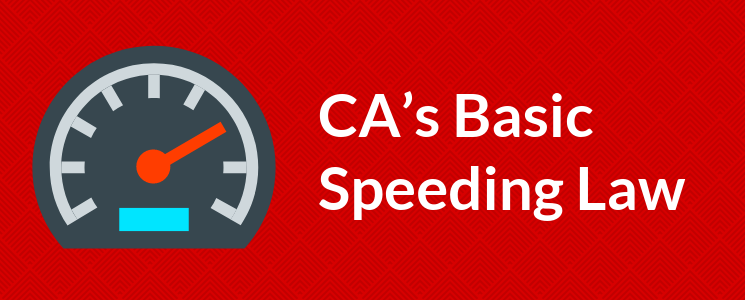
California’s Basic Speeding Law
The California basic speeding law is quite broad and to-the-point by design. It simply states this: A person operating a motor vehicle should never drive faster, “than is reasonable or prudent having due regard for weather, visibility, the traffic on, and the surface and width of, the highway, and in no event at a speed which endangers the safety of persons or property.”
In other words, you should adjust your speed to road conditions when there are obvious risks. Road conditions like rain, heavy traffic, construction, or narrow lanes can create circumstances where the posted speed limit is still likely to make you and everyone else on the road unsafe.
Because of this law, a driver can get nailed with a speeding citation (ticket) even if they were following the posted speed limit. This scenario is especially likely if the driver gets involved in an accident where they were driving at too fast of a speed to account for road conditions.
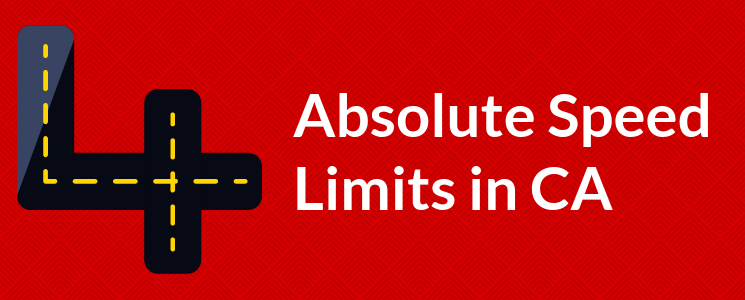
Absolute Speed Limits in California
California roadways try to keep drivers informed of designated speed limits, but drivers can always assume that they will not be allowed to drive faster than as follows:
- 70 mph on certain freeways where that is the posted speed
- 65 mph on freeways and major highways not posted for 70 mph
- 55 mph on undivided, two-lane highways with no higher posted speed
The main purpose of this law is to get rid of gray areas while helping drivers be aware that there are limits to their speed no matter where they go. Again, ignorance of these laws is no excuse. California drivers should no that there’s no public road in the state where they are legally allowed to drive above 70 miles per hour.
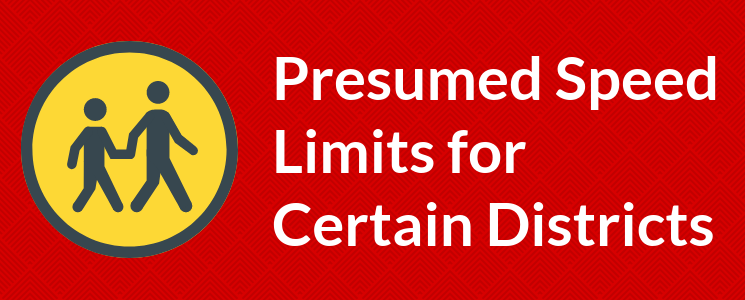
Presumed Speed Limits for Certain Districts
These laws act similar to the absolute speed laws above but try to designate speed limits for inherently dense or risky areas. Even if there is no speed limit posted for a road or byway, a California driver can assume they are expected to maintain the following speeds:
- 25 mph in residential neighborhoods, business districts, and all school zones
- 15 mph in alleys, at all railroad crossings, and at highway intersections where visibility for approaching traffic is less than 100 feet

What Happens When You Break Speeding Laws in California
California state laws lay out what is known as “base fines” for violating the above speed limits or any limits posted along a roadway.
Note that these penalty guidelines just do indeed serve as the base for what drivers can expect to pay. Many counties and municipalities have their own set of rules to add to or modify the state’s base fines laws. Drivers can also expect to pay additional court fees and “penalty assessments” on top of their base fine amount.
All that notwithstanding, here are the state’s base fine amounts according to how fast the driver was going over the speed limit at the time of their violation:
Thanks to our state’s legendarily devil-may-care drivers, there also exists a separate set of penalties for drivers caught going more than 100 miles per hour:
- 1st offense: Maximum base fine of $500 a possible license suspension up to 30 days
- 2nd offense: On a second >100 mph speeding conviction within 3 years, drivers face a maximum base fine of $750 and a likely 6-month license suspension or restricted license
- 3rd offense: Drivers convicted of a third >100 mph violation within 5 years will see base fines up to $1,000 and will likely have their license suspended or restricted for 1 year
Drivers who violate speeding laws, “in willful or wanton disregard for the safety of persons or property,” face additional penalties. These penalties are especially likely if the driver caused a serious accident that lead to a major injury or death.
For a first reckless driving offense, a driver could face between 5 and 90 days in jail alongside fines that can range from $145 to $1,000 — added to the base fines above. A speeding violation that leads to the death of another person could also easily lead to vehicular homicide or manslaughter charges.
In addition to fines and jail time, points may be added to your license. If you accumulate a certain number of points within a specific timeframe, your license will be suspended.
Getting Help from San Luis Obispo Car Accident Lawyers if You Have Been Injured by a Speeding Driver
Car accident victims hurt by the negligent actions of speeding drivers can find consolation through insurance claims or court lawsuits. The speeding driver can be alleged to be the primary or sole cause of the accident that led to the injury, making them potentially liable for the damages they cause. Medical bills, lost income, pain and suffering, and compensation for permanent disfigurement or disability can all be recovered through a successful personal injury claim.
If you have been hurt by a speeding driver, do not hesitate to exercise your right to seek due compensation. You can work with experienced San Luis Obispo car accident lawyers who can file a claim, negotiate with insurers, and help you navigate the court system in beneficial ways. Contact us online or by phone now to schedule your free consultation.
Camp Fire: Everything You Need to Know
Camp Fire started on November 8, 2018, and became the most destructive and deadliest wildfire in California history. Beginning on Camp Creek Road in Butte County, it destroyed over 153,000 acres (slightly bigger than the size of Chicago) before it was finally contained on November 25.
Worse than the damage the fire caused, Camp Fire killed 88 people, and 203 are still missing (as of November 27). At Ernst Law Group, our thoughts and prayers are with the families of those who are missing, injured and deceased.
So far, no culprit has been positively identified, though Pacific Gas and Electric Company (PG&E) is widely considered to be at fault. When they are, however, our San Luis Obispo personal injury attorneys will be standing by to help victims and their families get the compensation they deserve.
Below is everything we know so far about Camp Fire, including how you can help victims of the fire.
Timeline of the Camp Fire

View/Download PDF
Nov. 8, 6:33 a.m. PST: Fire reported. Firefighters were called to a brush fire under Pacific Gas and Electric Company (PG&E) power lines in Butte County. Later, PG&E reported downed power lines.
Day of Nov. 8: Due to high wind speed (50 mph) and low humidity, the fire rapidly spreads. Evacuation warnings issued to Paradise and other local communities. Firefighters stop attempting to control the fire and instead help people evacuate. Some communities are unable to evacuate before the fire arrived.
Nov. 9, 8 p.m. PST: Camp Fire spreads to 20,000 acres. About 15,000 structures threatened. Virtually all of Paradise, California destroyed in the quick-spreading fire.
Morning of Nov. 10: Camp Fire spreads to 100,000 acres. 20% contained. More than 6,700 structures destroyed, making it the most destructive wildfire in California history in just two days. Total confirmed death toll raised to 23.
Nov. 11: Death toll raised to 29.
Nov. 13: Fire reaches 125,000 acres, 30% contained. More than 8,700 structures destroyed, death toll increased to 48. Now the deadliest wildfire in California history.
Nov. 15. 140,000 acres burned, fire is 40% contained, still threatens more than 15,000 structures. Nearly 6,000 firefighters, more than 600 engines, and other emergency crews and equipment from all over the western United States are deployed.
Nov. 16: 146,000 acres burned, 50% contained. Death toll increased to 71.
Nov. 17: 149,000 acres burned, 55% contained. Death toll increased to 76.
Nov. 18: Death toll increased to 77.
Nov. 19: Death toll increased to 79.
Nov. 21: Death toll increased to 83. Fire 85% contained. Rain aids in the containment process.
Nov. 22: Fire 90% contained. Heavy rain continues to fall, aiding in the containment process.
Nov. 25: Fire 100% contained.
Total Destruction of the Fire
The numbers of the aftermath of Camp Fire are devastating. As of November 27, the totals include:
- 88 civilians confirmed dead (86 being seniors). 16 positively identified, 54 tentatively identified.
- 203 remain missing.
- 2,689 once believed missing have been found.
- 3 firefighters injured.
In addition, the structures destroyed include:
- 13,972 homes
- 528 commercial buildings
- 4,293 additional structures
Resources for Camp Fire Victims
Recovering from the Camp Fire will be a long process. Structures will need to be rebuilt, and some things lost will never be recovered. For victims and their families, there are resources that can be helpful.
Camp Fire Hotline
The hotline is open to anyone who is looking for shelter after the fire. The hotline will also provide other resources and information for evacuees, victims and their families. You can call the hotline by either calling 2-1-1, or by texting your ZIP code to 898-211.
Camp Fire Structure Status
For those who have property in and around Paradise, ArcGIS has created a Camp Fire Structure Status map. You can quickly peruse the map and see how much damage has been done to your property, as well as the surrounding property. Note that these reports are subject to change.
Paradise Post
This local newspaper is staying on top of all updates regarding the fire, including air quality alerts, missing person updates, and more. If you or or loved ones are displaced from Paradise, be sure to keep Paradise Post bookmarked on your computer.
Missing Persons Reports
If your loved one is still missing, the Butte County Sheriff’s Office has a running list of unaccounted for persons. If you or a loved one are listed as missing but has now been found, you can call the task force listed on the site to update the list. You can also mark yourself “safe and well” on American Red Cross’s website.
FEMA
The Federal Emergency Management Agency has deployed Mobile Registration Intake Centers throughout California to help register survivors. There are units in Gridley, Chico and Oroville currently, but are subject to move. Survivors and their families can also contact FEMA to learn about temporary shelter and aid.
Lost Livestock and Pets
If your pet is missing after the fire, contact North Valley Animal Disaster Group to make a report. Those who are missing livestock in the area affected by the Camp Fire can obtain a letter that allows them to pass through restricted zones to find and care for their livestock. Letters can be obtained from the Butte County Agriculture Department.
Transportation
Due to air quality and to help those who lost their vehicles in the fire, the B-Line is currently offering free rides on all Fixed Route buses until the end of November. Additionally, the Chabad Jewish Center in Chico is planning to give away vehicles to those who had to abandon their vehicles while evaluating the fire.
Housing
Many Good Samaritans are opening their homes to those whose homes were destroyed in the fire. If you need housing, you can find a full list on Camp Fire Housing’s website. Additionally, if you are in a position to provide housing, you can list your information on the same site.
How to Help Camp Fire Victims
In addition to the above resources, there are many ways you can help victims of Camp Fire. The most urgent need right now is cash and gift cards. Victims are trying to rebuild their lives, and any little bit can help.
Of course, giving out cash to just any organization claiming to help victims can be dangerous. After all, scammers will take this opportunity to take money from any unwary but good-hearted person.
Here is a list of the top organizations who work closely with victims of the fire:
In addition to monetary donations, there are other ways you can help victims with the American Red Cross. You can donate your time by volunteering. Or, you can find a local blood drive to help those who were injured by the fire.
Who’s Responsible for Camp Fire?
As of Nov. 27, no party has officially been named liable for the Camp Fire. However, Pacific Gas and Electric Company (PG&E) will likely be held responsible. It was their power lines that were found downed at the original site, and that presumably led to the massive wildfire.
However, if PG&E is found responsible, they may not be able to pay out compensation owed to victims. Their business insurance coverage wouldn’t cover all of the costs, leaving the company itself responsible for damages incurred by the fire, plus any legal fees and fines. Currently, their liability insurance coverage for wildfires is about $1.4 billion.
On its own, PG&E reports it has $3.46 billion on hand after tapping an existing credit line. That brings the total the company can cover to $4.86 billion.
The damages alone could cost upwards of $7 billion (not including legal fees and fines).
If PG&E is found responsible, they may need a bailout from the California state government. In September 2018, the California legislature passed a bill that allowed utility companies like PG&E to pass on the liability costs of wildfires to their customers. Many critics considered the bill a bailout for PG&E. The company was found liable for a wildfire in 2017.
No matter how they come upon the funds, if PG&E is found responsible for Camp Fire, they will be responsible for paying compensation to victims. However, this may come at a cost to taxpayers and/or PG&E customers.
How You Can Get Compensation After Camp Fire
After Camp Fire, many victims are left with questions as they try to rebuild their lives. Namely: Can I get compensation for my losses? While the process of obtaining compensation from PG&E may be a long one if they’re found liable, there may be other options.
Filing with Your Insurance Company
If you have been affected by a wildfire, the first phone call to make is to your insurance agent. While most policies over house fires, some are specific in that it needs to be only to your own home and accidental. Many policies don’t cover wildfires, especially if you live in an area of the state that is prone to these disasters.
In many cases, a wildfire does not only destroy the physical home. It can take property, vehicles, outbuildings and more. It can also cause injury to yourself and your family. The costs of replacing these items quickly adds up and may not be entirely covered by an insurance policy.
It always pays to check your insurance policy before you are subject to such damage. If you aren’t sure whether or not your policy will cover all that you could possible lose in a wildfire, reach out to your insurance agent and discuss your needs. You may need to purchase additional coverage to protect your property.
Filing a Lawsuit
Once you have contacted your insurance agent, you may discover that you need to file a lawsuit to recoup damages. If the police have caught the person who caused the fire, that may be who you name. In this instance, if PG&E is named liable, they may set up a fund to cover compensation claims.
As mentioned above, PG&E likely doesn’t have enough money to cover all the damages suffered by victims. As such, they may only hand out limited compensation amounts per claim, which may not cover all of your losses. Our attorneys will fight to get every dime they can from the liable party so you can start rebuilding your life.
Losing your home in a wildfire is certainly one of the most stressful things you can go through. You may feel overwhelmed and as if you have nowhere to turn. The officials who respond to the fire will assist you with your immediate needs, and an experienced attorney can help you with your future needs.
Speak to a San Luis Obispo Personal Injury Lawyer Today
If you have been through a wildfire and have lost your home, property and more, know that you are not alone.
If you have been affected by the Camp Fire, our team of experienced San Luis Obispo personal injury attorneys is here for you. Though our area was luckily unaffected by the Camp Fire, we’re here to help displaced victims and their families get the compensation you deserve.
Reach out to our office today to schedule your free case evaluation. We can help you fight the insurance companies and the people found to be responsible for the fire. Call us for the assistance you need.
Teen Motorcyclist Killed on Highway 101
Another tragic case was reported this week. An 18-year-old motorcyclist was killed on October 6, 2018 on Highway 101 just south of Arroyo Grande at the El Campo Road crossing. CHP Reports that the driver of a BMW turned left into the motorcyclist’s path of travel.
There are only a few places in San Luis Obispo County where a cross street intersects with the Freeway without any traffic controls. We have seen numerous traffic collisions at the intersection of Wellsona Rd and Highway 101 in the north county.
The Highway 101 / El Campo Rd is another spot where drivers intending to go North from El Campo Rd are forced to cross the southbound lanes of 101 and then merge into the northbound traffic. From my our driving history, we can attest that this is a harrowing experience.
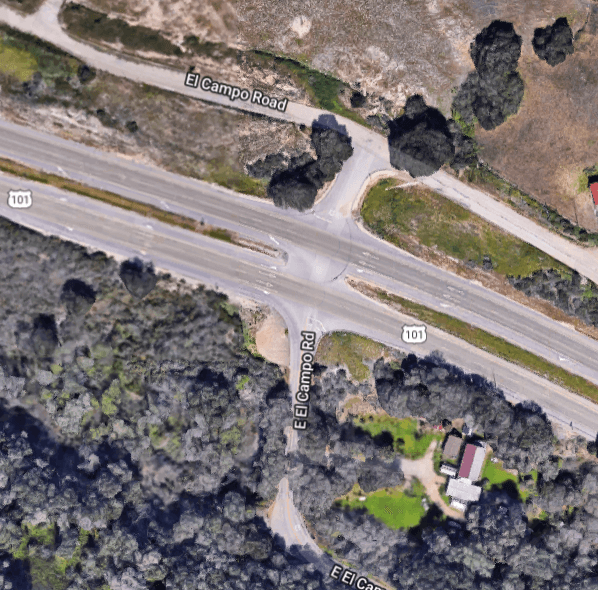
Intersection of El Campo Road and Highway 101 in San Luis Obispo
To the West of the highway, there are many large homes and a golf course. Years ago, El Campo may have been a rural road without much traffic, but today it’s a busy street with a large number of people traveling north to San Luis Obispo. It’s not uncommon to hear about people who refuse to cross at El Campo, even though an alternative route can add 15 or more minutes to the trip.
The driver of the BMW was reportedly not arrested. If this was a matter of a driver looking, but simply not seeing an oncoming motorcycle, it is a tragic mistake. The driver of the BMW, even if “just” negligent, is still liable for the wrongful death damages suffered by the motorcyclist’s family. The California DMV Handbook specifically warns drivers to be on the lookout for motorcycles.
The NCBI has conducted an exhaustive literature review of motorcycle Right of Way crashes. Attention of the other drivers and conspicuity of the motorcycle are the most common causes of crashes. For some reason, human factors studies have shown that driver tend to judge cars as arriving quicker than motorcycles.
This means that if a driver waiting to cross at El Campo saw a car, he or she might properly judge the time to cross. But, if a motorcycle is the approaching vehicle, the driver is likely to overestimate the time he has to safely cross.
This is no doubt one of the factors that lead to a large number of motorcycle fatal crashes. The NTSB reports that riders of motorcycles are 28 times more likely to be killed in a crash than are drivers of other types of vehicles. The reason is obvious: the rider has far less protection. This doesn’t make it the riders fault; to the contrary, it just increases the need for vigilance on the part of driver.
At Ernst Law Group, we have handled many motorcycle cases. Nearly all are tragic cases. It is important in handling any type of road crash case to examine if there is a public entity also liable for the loss.
In this case, one must explore whether or not Cal Trans is responsible in part for failing to reroute traffic, installing an overpass, or putting in a traffic signal. These cases are known as Dangerous Condition of Public Property cases and require careful legal handling.
If you’ve been injured in a motorcycle accident in San Luis Obispo, give our team a call at (805) 541-300 or contact us online for a free, no-obligation consultation. We’re here to help you get the compensation you deserve.
How Drug Use Influences Trucking Accident Statistics
FAST FACTS
- 30% of truckers have admitted to amphetamine use.
- Nearly 20% have admitted to using marijuana.
- Approximately 3% have admitted to cocaine use.
The reality of being a trucker is that there are going to be long stretches of boredom, since it’s just the driver alone in the truck. This allows for some strange things to occur during their downtime, both good and bad. While it can be fun to listen to some of the silly things that go on at a truck stop, there’s also a darker side that should be noted.
An October 2013 study from the University of Amsterdam notes there is a good chance that some of the truckers on the road have imbibed in alcohol or illicit drugs before getting behind the wheel.
The Amsterdam study collated similar studies that were done with truckers in Australia, Chile and the United States. It’s important to make a distinction between what the studies covered and what they didn’t.
Truckers and Drug Use
The studies asked truckers whether or not they’d ever driven under the influence of drugs or alcohol, not checking with the companies how many employees had failed a drug test. The methodology of the various responses certainly brought up a wide range of results to consider. Drivers admitted to having used alcohol and cocaine at places like truck stops and gas stations.
With such varied responses, a company would have many different routes to take. First of all, if someone who’s been known to use such drugs before gets involved in an accident, then a company would probably have grounds for a suspension pending an investigation.
They’ll be able to figure out what to do after the investigation is finished. But if the accident is serious, the driver could be terminated if they’re found guilty. This doesn’t even touch on the possibility of being fined and the driver losing the chance to work.
Of course, all of the apocalyptic scenarios are just that, scenarios. It’s up to the companies to properly police their employees with consistent testing and making the consequences of those actions very clear. Along similar lines, workers need to understand that driving under the influence, no matter how small, can lead to some major consequences.
If the driver develops a reputation as someone who can’t be trusted, then they’re out of luck. The world of trucking can be very difficult and spots are limited, so it makes sense that a driver who can stay clean will benefit financially from others’ misfortune.
What’s more, in about 5 percent of all fatal truck accidents, the truck driver was under the influence of drugs. It’s hard to say those accidents wouldn’t have still happened if the trucker was sober, but it’s safe to say the drugs did play a role.
Reasons Truckers Give for Drug Use
When the numbers are made more clear, the average citizen has only one question: Why? Truckers aren’t ignorant of the dangers of drugs and alcohol use. They know the risks they are posing to themselves and others. Why, then, would they choose to get high before getting behind the wheel? Reasons vary, but the need to stay awake often tops the list.
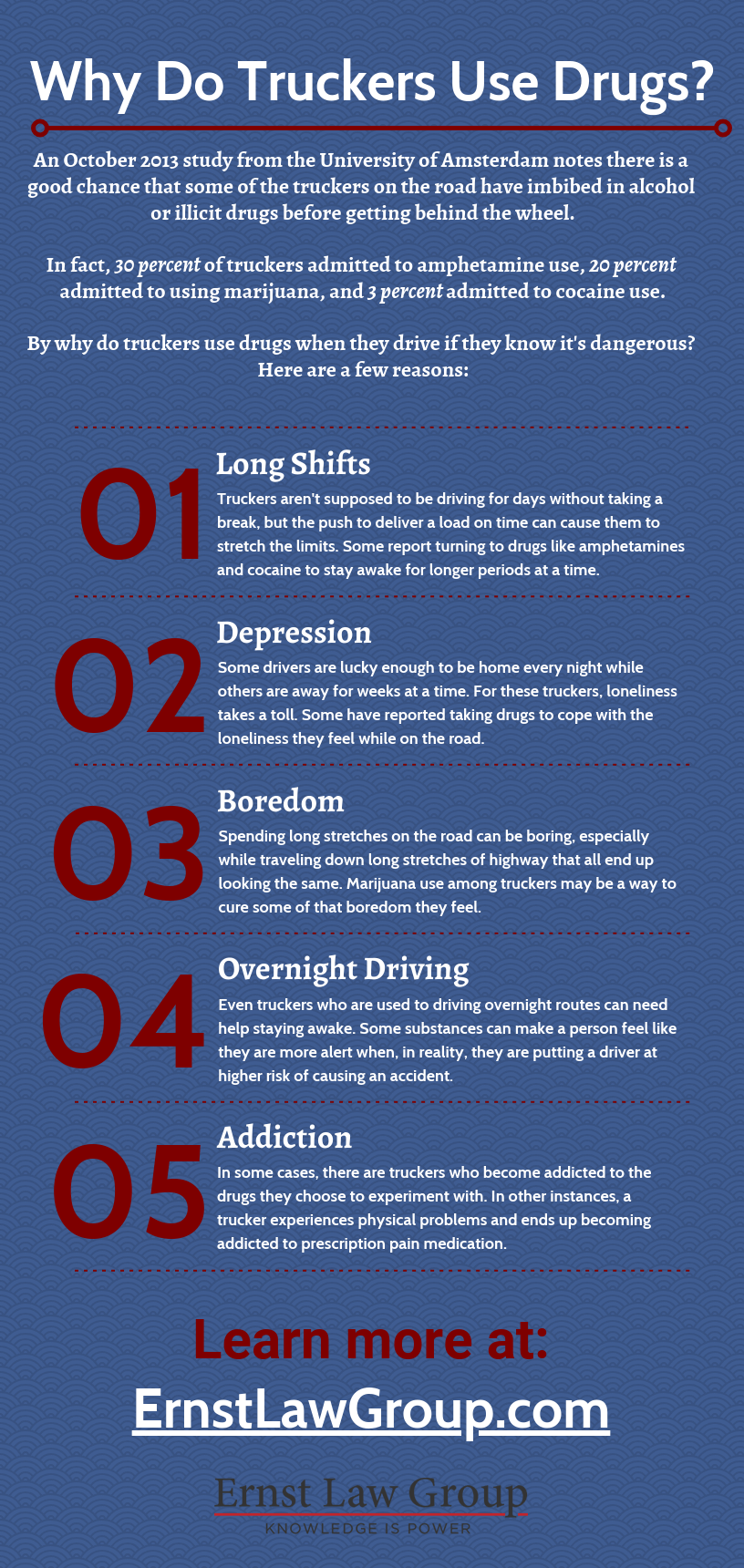
View/Download PDF
Some of the most common reasons cited for illegal drug use include:
1. Long Shifts: Truckers aren’t supposed to be driving for days without taking a break, but the push to deliver a load on time can cause these men and women to stretch the limits.
Some report turning to drugs like amphetamines to stay awake for longer periods at a time. Truckers also say that they use cocaine for the same reason.
2. Depression: Some drivers are lucky enough to be home every night while others are away for weeks at a time. For these truckers, loneliness takes a toll.
Some have reported taking drugs to cope with the loneliness they feel while on the road. It’s never a good idea, as many drugs actually worsen depression instead of alleviating it.
3. Boredom: Let’s be honest, spending long stretches on the road can be boring, especially while traveling down long stretches of highway that all end up looking the same.
Marijuana use among truckers may be a way to cure some of that boredom they feel.
4. Overnight Driving: The human body is meant to sleep at night, not drive. Even truckers who are used to driving overnight routes can need help staying awake. For these drivers, drugs seem to be the answer.
Some substances can make a person feel like they are more alert when, in reality, they are putting a driver at higher risk of causing an accident.
5. Addiction: In some cases, there are truckers who become addicted to the drugs they choose to experiment with. The reason they continue to take drugs is because they can’t stop. In other instances, a trucker experiences physical problems and ends up becoming addicted to prescription pain medication.
Drug use behind the wheel is not okay, no matter the reason. Truckers who choose to partake in drugs and alcohol before slipping into their cabs are urged to get the help they need. People’s lives are in danger when a driver operates their rig while impaired. Not only are they taking their own lives in their hands, but the lives of everyone else on the road.
Our San Luis Obispo Truck Accident Attorneys are Here for You
If you are involved in an accident, you need one of our San Luis Obispo truck accident attorneys. We are here for you and will fight vigorously to ensure you receive the compensation you are entitled to under California law.
Reach out to our office today to schedule your free case evaluation or contact us online. You do not deserve to be placed under financial strain because a trucker made a poor choice.
Safety Tips for Those Electric Scooters You See Everywhere
FAST FACTS
- More than 67,000 people were seen in ERs in 2009 due to electric scooter related injuries.
- Wearing a helmet can (more…)


 If the wrong way driver entered the northbound lanes heading south at this spot, it is likely that she entered the road as depicted below. A driver intending to make a right turn onto Clover Ridge is faced with two options, the second of which is the frontage road. The first road one would encounter is the northbound off-ramp. There are signs warning of entering the freeway off-ramp as “Wrong Way”, but the signed is placed directly between the off-ramp and the frontage road. Further investigation will be needed to determine exactly what happened.
If the wrong way driver entered the northbound lanes heading south at this spot, it is likely that she entered the road as depicted below. A driver intending to make a right turn onto Clover Ridge is faced with two options, the second of which is the frontage road. The first road one would encounter is the northbound off-ramp. There are signs warning of entering the freeway off-ramp as “Wrong Way”, but the signed is placed directly between the off-ramp and the frontage road. Further investigation will be needed to determine exactly what happened. The
The













